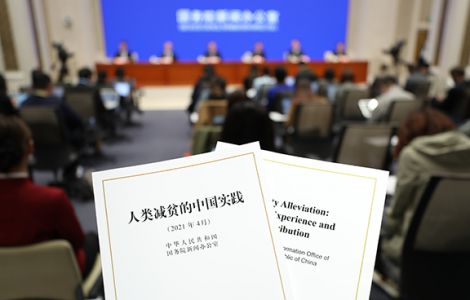中英对照:《人类减贫的中国实践》白皮书 [14]
Poverty Alleviation: China's Experience and Contribution [14]
到2035年,中国将基本实现社会主义现代化,乡村振兴取得决定性进展,农业农村现代化基本实现。那时的中国乡村,农业结构得到根本性改善,农民就业质量显著提高,相对贫困进一步缓解,共同富裕迈出坚实步伐;城乡基本公共服务均等化基本实现,城乡融合发展体制机制更加完善;乡风文明达到新高度,乡村治理体系更加完善;农村生态环境根本好转,美丽宜居乡村基本实现。
By 2035, China will have achieved basic socialist modernization. With decisive progress in rural revitalization by that time, agriculture and rural areas will be modernized and fundamentally restructured. Farmers will benefit from the quality employment which comes with better jobs, relative poverty will be further alleviated, and concrete progress will be made in achieving common prosperity for all. Rural areas will enjoy the same basic public services as urban areas, brought about by improved systems and mechanisms for urban-rural integration. Farmers will enjoy a better cultural environment in civil and neighborly communities, and benefit from improved rural governance. There will be a fundamental improvement in the eco-environment; the goal of building a beautiful, livable countryside will be basically realized.
到2050年,中国将全面建成社会主义现代化强国,实现第二个百年奋斗目标,乡村全面振兴。那时的中国乡村,农业强、农村美、农民富,经济社会全面进步,各项事业繁荣发展。那时的中国,全体人民共同富裕基本实现,中国人民享有更加幸福安康的生活,中国向着实现人的全面发展和全体人民共同富裕更高目标继续迈进。
By 2050, China will have become a great modern socialist country in every dimension, realizing the Second Centenary Goal and fully revitalizing the countryside. At that time, China will have a strong agriculture, a beautiful and revitalized countryside, and prosperous farmers, enjoying across-the-board progress in society and the economy, and thriving endeavors in every sector. At that time, the Chinese people will embrace a happier life in common prosperity, and the nation will continue to march towards higher goals of all-round development of the people and common prosperity for all.
中国的发展离不开世界,世界的发展也离不开中国。中国始终将自身发展与人类发展紧密相连,始终做世界和平的建设者、全球发展的贡献者、国际秩序的维护者。繁荣发展的未来中国,是更加开放包容的中国,是与世界形成更加良性互动的中国,是为建设更加美好的世界作出更大贡献的中国。
China cannot develop in isolation from the rest of the world; and the world needs China for further development. With this in mind, China has always been a builder of global peace, a contributor to global growth, and a guardian of the international order. In the future, a more prosperous China will also be more open and inclusive; it will interact more constructively with the international community, and make a greater contribution to building a better world.
附录 中国扶贫标准的变化和调整
Appendix Adjustments of China's Poverty Standards
根据国民经济社会发展水平和贫困人口基本生活需求确定扶贫标准,是中国实施大规模、有计划、有组织扶贫以来一直的做法。
China has implemented large-scale planned and organized poverty alleviation programs. Standards for poverty alleviation were formulated according to its social and economic development and the basic living needs of its poor populations.
中国第一次制定扶贫标准是1986年,为206元,对应的贫困人口数量为1.25亿,主要解决温饱问题。2001年制定第一个十年农村扶贫开发纲要时,将扶贫标准提高到865元,对应的贫困人口数量为9422.8万。2011年制定第二个十年农村扶贫开发纲要时,将扶贫标准提高到2300元(2010年不变价),对应的贫困人口数量为1.22亿。
In 1986, China set its first poverty standard at RMB206, designed to provide adequate food and clothing for 125 million poor. In 2001, when formulating the Outline of Development-driven Poverty Alleviation in Rural Areas (2001-2010), the nation raised the standard to RMB865 for 94.23 million poor. In 2011, when formulating the Outline of Development-driven Poverty Alleviation in Rural Areas (2011-2020), China readjusted the standard to RMB2,300 (based on the 2010 price index) to help 122 million poor.
脱贫攻坚以来,中国的贫困人口识别和退出以户为单位,主要衡量标准是“一收入”“两不愁三保障”。“一收入”就是该户年人均纯收入稳定超过现行国家扶贫标准,“两不愁三保障”就是稳定实现不愁吃、不愁穿和义务教育、基本医疗、住房安全有保障。中国的贫困人口退出标准是综合性多维标准,不仅衡量收入水平,还考量贫困人口生存权发展权的实现程度,体现了中国经济社会发展实际和全面建成小康社会的基本要求。
In the final stage of fighting extreme poverty, impoverished people in China were registered and deregistered by household. The criteria are personal incomes, and the household's situation with reference to the Two Assurances and Three Guarantees. The former requires that the annual average per capita income for a household remains steady above China's current poverty line. The latter refers to guarantees of adequate food and clothing, and access to compulsory education, basic medical services, and safe housing for impoverished rural residents.China's standards for deregistering those who have emerged from poverty are comprehensive, including income, and the extent to which they are assured the rights to subsistence and development. These standards reflect the realities of China's social and economic development as well as the basic requirements for achieving moderate prosperity in all respects.
注:为确保中英对照准确,“热词译”网站可能对中英文重新分段。

